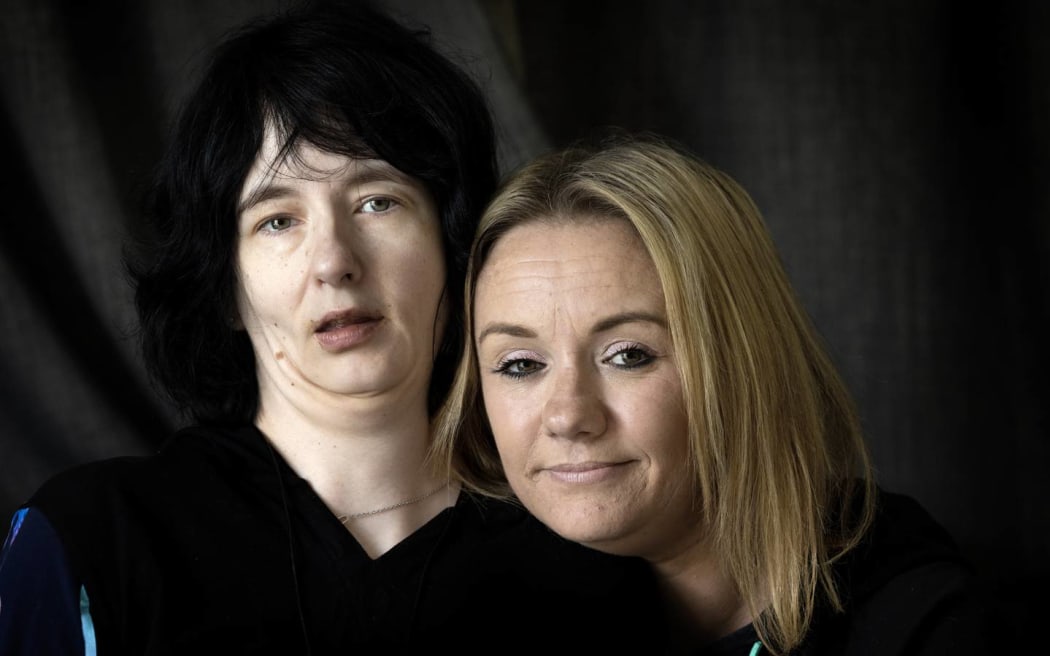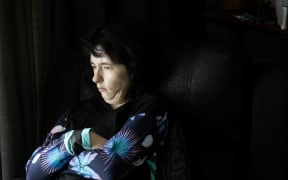
Anna Mills, left, suffers from myotonic dystrophy. Since being removed from an IDEA Services home by her sister Sarah-Jane Mills, her health has improved markedly. Photo: NZ Herald / Mike Scott
Police have confirmed they will investigate a complaint into allegations of neglect and an unreported death in an IHC home.
In November, the New Zealand Herald revealed that disabled woman Anna Mills weighed just 35kg when her sister Sarah-Jane Mills removed her from an IDEA Services residential care home in Gisborne almost five months ago.
Now it can be revealed the death of a resident at the same home forms part of the complaint to police by voluntary disability advocate Glenn Marshall.
And police confirmed to Marshall this week in writing that they would undertake an investigation into his complaint.
Marshall made the complaint when Whaikaha, the Ministry of Disabled People, did not after Anna's story came to light.
In the complaint, dated 7 December, Marshall asked the police to investigate Anna's care after she was found by Mills "critically unwell", malnourished, dehydrated, in soiled bedsheets and weighing 35kg.
Mills removed Anna, 38, and since returning home with her Anna's weight has increased to 54kg.
Mills made complaints to the Health and Disability Commissioner (HDC), the Human Rights Commission and the Ombudsman.
In Marshall's complaint to police over the case, he also requested an investigation into the care provided to an elderly resident at the same home that Anna lived at, before the elderly resident died unexpectedly in August this year.
The resident, who the Herald is not naming, died suddenly in an IDEA Services van, according to the complaint.
Marshall has also complained to WorkSafe over the cases and requested the Ombudsman investigate why Whaikaha did not lodge a complaint with police.
Whaikaha operational design and delivery deputy chief executive Amanda Bleckmann said the ministry was "still looking into these extremely serious allegations and determining what the next steps will be, including whether further action is required with police".
IDEA Services notified Whaikaha of the resident's death on 24 August.
"More recently, we became aware of additional information in relation to her death which raised concerns. As a result we sought further information from IDEA Services," Bleckmann said.
"It wouldn't be appropriate for us to publicly provide details of [her] health circumstances or the care she received until we have fully assessed the further information IDEA Services provided. This process is underway."
She said when there was a death in care, Whaikaha expected the provider to notify the ministry and provide an Initial Death Review giving details of what happened. That is then reviewed by Whaikaha.
She said the woman's family had not complained to Whaikaha about her death.
No notification had been made to the HDC as of earlier this month.
Whaikaha can lodge complaints with police on a case-by-case basis, taking into consideration the disabled person's wishes, Bleckmann said.
"However, we would note that it is the initial responsibility of service providers and, where relevant, medical professionals involved to refer an incident or death to police or the coroner, as they have firsthand knowledge of the circumstances."
Bleckmann acknowledged that police were following up the private complaint about the death.
"We are happy to assist them as much as possible if necessary."
An IDEA Services spokesperson said Gisborne staff were "greatly saddened" by the death of the resident and had been in close contact with her family.
"IDEA Services reports all deaths of people in our services directly to Whaikaha as required by our contract.
"Where there are any concerns related to a death, thorough investigations are conducted internally and the police notified who in turn refer the matter to the coroner.
"It is not the responsibility of the service provider to notify the coroner directly or the HDC. In this case, there are no investigations underway or a coronial inquest that we are aware of."
The coroner's office had no record of the woman's death but said under the Coroner's Act 2006, if a death happened in official custody or care, it must be referred to the coroner.
However, official custody or care did not include an IHC home but rather a prison, hospital, someone under a community treatment order, or under the care of Oranga Tamariki.
In information released to independent disability advocate Jane Carrigan under the Official Information Act, Whaikaha said there were 120 critical incidents each month reported by providers caring for intellectually disabled people, and 20 deaths.
It said residential providers were required to report deaths of disabled people receiving residential support and Whaikaha staff reviewed the deaths to ensure the quality of disability support did not contribute to the death.
Whaikaha staff can commission an investigation if needed. It said it had improved systems with regular auditing of its death recording and reporting process.
*This story originally appeared on the NZ Herald website.




